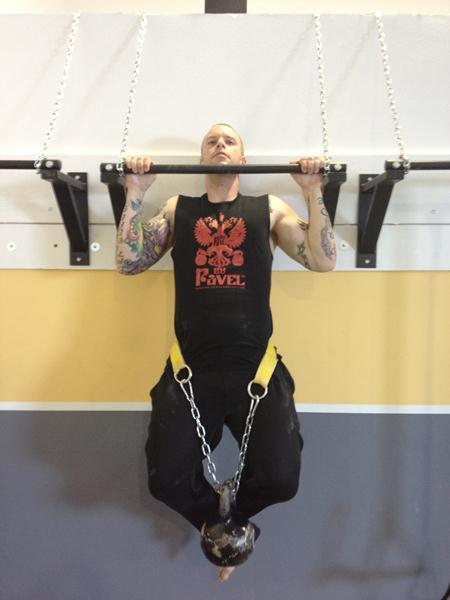
Dragon Door: You have an incredible story of recovery and lifestyle change, how did it all start, and what role have kettlebells played in your journey?
Ryan Karas: I played soccer for 15 years, but got into trouble my sophomore year in high school and stopped playing. I lost my motivation, things went downhill, and I got pretty heavily into addiction. After high school, things got worse, and when I was lifting, I had a severe inguinal hernia. After the surgery, my recovery was so long that I lost interest in all exercise. I started drinking very heavily—probably more in one day than most people drink in months. To make a long story short, I hit the bottom pretty hard and put myself into rehab where I stayed for 38 days. While I was there, my doctor told me that my kidneys had begun to fail, and I would have had only about two weeks left if I hadn't gone to rehab. After rehab, I went back to fitness.
Ryan Before Kettlebells:
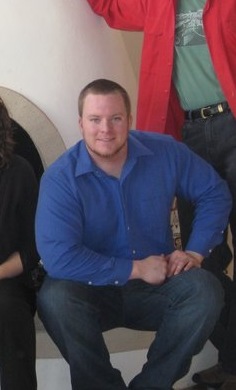
When I got back into lifting, I started with my old bodybuilding regimen. I had been obsessed with bodybuilding for years, but never saw much success because I was very heavyset. I was working out in my gym one day when one of the guys recognized my strength. He told me to try training at Revolutionary Fitness. That's where I met Slade Jones, who's now my best friend. Training at Revolutionary Fitness was completely different from what I was doing before, and I was introduced to kettlebells by doing double kettlebell front squats to the point of puking.
At the time, I was confident about my strength, my lifts, and how much I could curl. Then Slade said, "Let's see how strong you really are." Then, he put me through a very physical assessment circuit. Basically, the workout was chin ups and pull ups, paired with double kettlebell front squats using 24kg and 22kg kettlebells. I lasted for about 7 or 8 minutes and then I puked. I’ve been an athlete all my life, but I’ve never thrown up from working out—I think I fell in love with kettlebells when I was throwing up!
When I started doing really heavy kettlebell and barbell training with Slade, I began to lose a lot of weight. I had checked into rehab in January of 2011, weighing about 270lbs with around 30-35% body fat. In 20 months, I lost almost 90 pounds of fat while gaining muscle. Now, I weigh around 200 pounds and am more athletic than I've ever been, even when I was playing soccer. I'm naturally strong, but what drew me to the kettlebells is that no matter how much progress I make, there are always more challenges.
Ryan now:
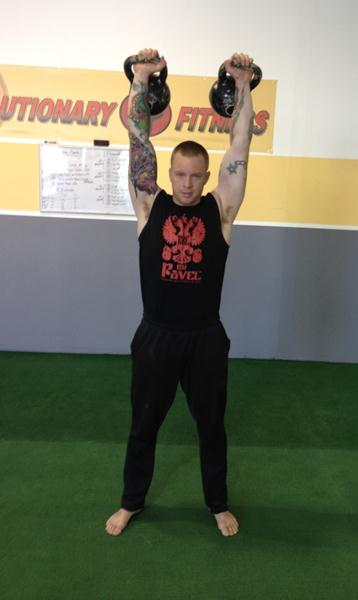
When I started with kettlebells, I found Max Shank's videos on YouTube. He became a kind of idol and really inspired me since we are about the same age. Before the RKC workshop, I also found Zar Horton and FireBellz in Albuquerque. Zar is very strict with his training, and really pushed me. I thought I was in good shape—then I worked out with Zar and I found out I had more work to do! Zar helped me prep for the RKC, and I'm very grateful for his training because he showed me all the proper movements.
I am the kind of person who needs direction and a specific motivation. I focus really well on one thing. What I found with kettlebell training—especially after the RKC workshop—is that it's very similar to martial arts training because it requires focus, dedication, and practice. Something else I really liked about the RKC was the strong community. The people that are involved in RKC seem like a big family that's always trying to help each other—I love that. Zar told me that going to the RKC workshop is like joining a community. This is very appealing to me because there's no limit to what you can learn with so many accomplished and high level instructors in the RKC.
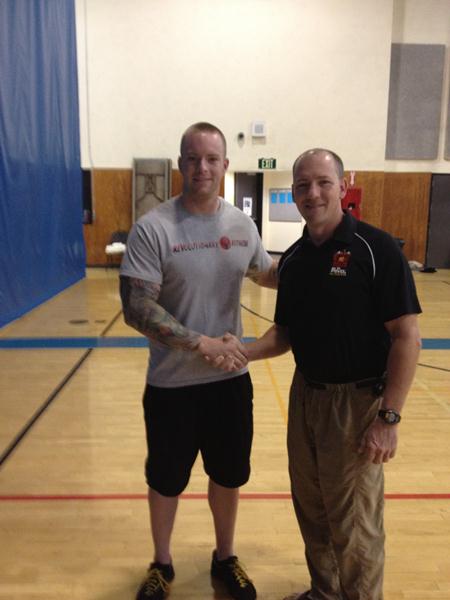
After the first day of the workshop, my girlfriend asked me how it was, and I honestly felt like it completely changed my outlook and my life. I've had some pivotal moments in the past 20 months, one of them was rehab, and the other was the RKC Workshop. I thought the workshop was run very well, and I was intrigued and drawn in by Brett Jones' style of instruction. I really want to be as much of a part of the RKC as I can.
Dragon Door: I think Brett Jones has a great teaching style...
Ryan Karas: And, he is hilarious which always helps. A big thing for me was the fact that the instructors weren't arrogant at all. They really were there to help us learn. When I went up to meet Brett Jones, I was a little bit star struck because he's a big name in the fitness community, especially with kettlebells. But, it was a breath of fresh air when I walked up to him and started talking. He was humble and talked to me just like anyone else.
Dragon Door: How did you originally decide to do the RKC?
Ryan Karas: I was at a pivotal point, and ready to decide what I really wanted to do with my life. I was truly inspired by my best friend Slade who had been nominated as the best personal trainer in Albuquerque at age 23. I really like the way that he runs his gym, it's like a family. It's very tight knit, and the way that he trains is very inspiring.
So, I decided that I wanted to be a personal trainer with broad knowledge, but I also wanted to have a specialty—I wanted to be a kettlebell coach. I look at kettlebell training as an art; the amount of work that goes into proper kettlebell movements is almost like a martial art. It was very appealing to me, and once again I think watching some of Max Shank's videos had a lot to do with it—I wanted to learn it all immediately.
When I saw the video of Max Shank juggling a 40kg kettlebell, I set my mind to do that someday. I was always drawn to the kettlebells in the gym, even when I didn't know how to really use them. There is something about watching the old Russian videos on YouTube with guys doing ridiculous kettlebell stunts, and the competitions where they do a crazy number of snatches in 10 minutes. It was just very intriguing to me, and it's developed into a passion that I want to practice for the rest of my life.
Dragon Door: What's your favorite kettlebell exercise?
Ryan Karas: I love the one arm alternating swing. And even though I probably do it far from perfectly, my other favorite exercise is the bent press. I also love the pistol squat, there's so many exercises!
Dragon Door: Now that you're an RKC instructor, what's next?
Ryan Karas: I would like to open my own kettlebell studio. That's probably about 10 years down the road, but it is my ultimate goal. As a short-term goal, I would love to go for the CK-FMS. I hope to work under Zar Horton in my home town, it would be great to learn more from him. On Sunday before I left the workshop, I went up to Brett Jones and said, "I was recommended as an assistant which was my goal for the RKC Workshop. What should I do next?" He said I should do the CK-FMS, if I plan on teaching—so that's my next goal. I really want to learn as much as I can and grow in the RKC community.
I'm proud that I was recommended as an assistant. I was really there to learn and went in to the workshop as if I didn't know anything, hoping to learn as much as possible. So, to go from knowing nothing to being asked to come back as an assistant was flattering.
Dragon Door: That's huge, it speaks incredibly highly of you.
Many times, RKC workshops can be times of reflection, or realization, have you come to any particular conclusions this weekend?
Ryan Karas: It kind of dawned on me that the overall goal for my certification was to teach other people how to become more healthy. It blew my mind to remember that 20 months ago, when I checked myself into rehab, I was two weeks away from dying. The doctor said that because my kidneys were failing, I had two weeks left at the most. It's very humbling to feel like I've been blessed with the opportunity to teach people how to change their lives when 20 months ago, I was in a place of complete helplessness. I'm pretty spiritual, so I give a lot of credit to God. I feel like getting to where I am now, from where I was less than two years ago was a small miracle.
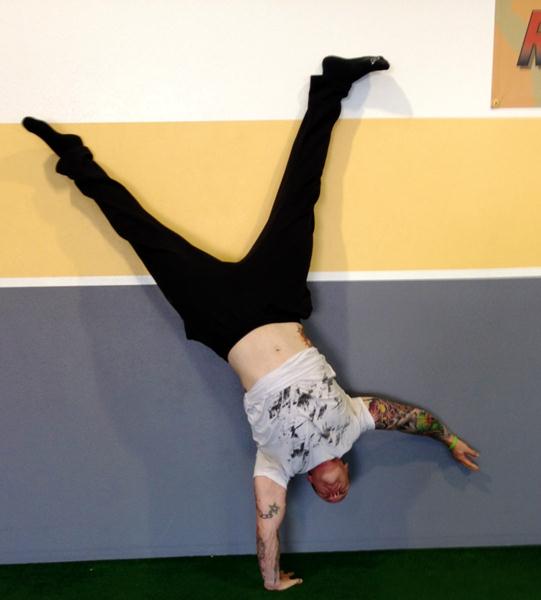
I think my best trait is teaching, which is why I think I was recommended as an assistant. When we did the "victim" teaching test, most of my whole team was paired with athletic people and I was paired with a 65-year-old man with a knee replacement and a hip injury. So I taught around his injuries. My instructors, Robert Budd, Mike Sousa, and Katie Dawers came up to me afterwards saying I did extremely well, and that I did the right thing by not making him do too much at once.
Dragon Door: Sounds like you showed very good judgment.
Ryan Karas: Well, because of the knee replacement, he could only do about a third or quarter of a get-up. So I had him doing quarter get-ups and since he needed help with the deadlift, we just worked on perfecting his deadlift. His workout included deadlifts, hip bridges, planks and quarter get-ups.
One of my better qualities is that I tend to go into seminars or workshops without assuming I know everything. At the RKC for instance, in comparison to the people who were teaching me, I really do know nothing. So, I go in with that attitude and try to soak everything up.
Dragon Door: That's a great approach to take at workshops. Congratulations on staying sober and becoming an RKC.
